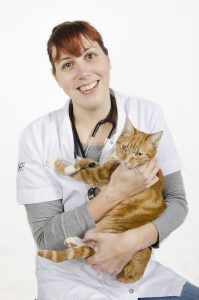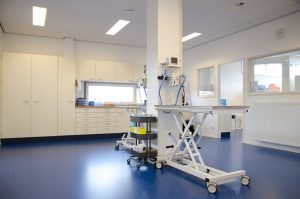
Marieke & Pip
As veterinarian with a special interest in cats, I can be of help of you and your cat(s) in different ways. Not only when your cat has an illness, but also for advice and health checks for your elderly cat or your cat with chronic kidney disease. I work in the Veterinary Referral Center in Dordrecht, a large veterinary clinic with lots of possibilities.
Cats are great, but they can be very challenging too, especially when they’re ill. They tend to hide their problems and often the only complaint is that they don’t do so well or they eat less/ lose weight. Therefore, it can be very hard to find out what exactly is wrong with them.
What can I offer?
I can offer you an extensive consultation of at least 30 minutes. First of all, a detailed medical history of your cat will be taken, including diagnostic tests that have been performed and treatment that has been tried. During this time, your cat can get used to his environment, to decrease some of the stress that might be there. Furthermore, I use the stress-reducing pheromone Feliway in the consultation room. Doing all this helps to make the visit much more enjoyable for both you and your cat.
After taking a complete medical history, a comprehensive physical exam is done.
Based on the findings, a follow-up plan is made together with you. Together is the key word! We will talk through the possible diagnostic/ therapeutic options, including the benefits, drawbacks and cost of each step. If further diagnostic testing is necessary (and this is often the case), it is (almost) always possible in the clinic I work, by myself or by one of my colleagues. In the end I create a cat friendly treatment plan, unique for your cat. After your visit to the clinic, you will receive a full rapport via e-mail.
Possibilities in the veterinary clinic
In the clinic I work at, the Veterinary Referral Centre in Dordrecht, there are many diagnostic and treatment options available.

Emergency & Critical Care unit
- Blood pressure measurement
- Ultrasonography (both abdominal and cardiac ultrasound)
- Digital X-rays
- Elaborate laboratory
- CT-scan
- MRI-scan
- Endoscopy
- Blood transfusions
- Comprehensive emergency and critical care unit with oxygen cages and incubators among other things
- Extensive surgical possibilities including orthopaedic surgery, neurosurgery and soft tissue surgery.
There are multiple specialists working in our clinic and there is a good collaboration between veterinarians of the different disciplines. This way, we make sure your cat receives the best possible medical care.
Making an appointment
If you would like to make an appointment, you can contact me through the contact form. I will then contact you to plan in an appointment together. In general, clinic appointments are by referral only. Prior to the visit, I would like to receive all relevant information regarding your cat from your vet (i.e. diagnostic results, medication). After your visit a comprehensive rapport will be send to your own vet, to keep him/ her informed.
Care for geriatric cats
The care for geriatric cats and cats with CKD are areas that have my special interest. Diseases that are seen often in elderly cats are: dental problems, arthritis, CKD, thyroid problems, hypertension etcetera. I am convinced that prevention is better than cure. With regular health checks for geriatric cats we can detect many diseases earlier and offer more effective treatment. This will result in longer and healthier life for your cat. A health check for geriatric cats is indicated for every cat over 10 years old.
What is a health check for geriatric cats?
A health check for geriatric cats will take approximately 30-45 minutes and will include the following:
- Filling in a questionnaire about your cat’s situation and condition (prior to the visit)
- Extensive medical history taking
- Physical exam where your cat will be examined from top to toe paying particular attention to areas that can be affected by geriatric illnesses.
- Eye exam (funduscopy): hypertension, something that is seen quite frequently in geriatric cats, can sometimes cause abnormalities in the eye
- Blood pressure measurement: as said, hypertension is seen quite frequently in geriatric cats. Unfortunately, this disease is not visible on the outside of your cat until it is too late and significant damage has occurred (for example blindness or a stroke). That is why hypertension in cats is also called the assassin.
- Blood work: during the visit some blood is taken and send to an external lab for an extensive screening (i.e. kidney function, liver function, glucose, thyroid function).
- Urinalysis: illnesses like kidney disease and diabetes mellitus occur more frequently in older cats and can be identified via urine testing. Samples can be collected with the cat at home or in the clinic.
- A complete and extensive rapport will be send to you by e-mail, covering all the findings and my custom tailored advice for your cat
These tests are the so called “5 course menu”. Together, we can always decide to skip certain tests or add other tests.
Cats with chronic kidney disease (CKD)
It is estimated that more than 33% of cats older than 15 years of age have kidney disease. With new, more sensitive blood tests available, that percentage is expected to increase. With an early diagnosis and the right coaching many cats are able to live happily for years. In my experience these are very grateful patients (and owners) and my bond with these cats is often special.
How can I help your cat with CKD?
A consultation for a cat with chronic kidney disease includes the following:
- A detailed history taking of your cat’s wellbeing. Keeping records of the eating and drinking habits of your cat and even more important, keeping track of your cat’s weight is very helpful.
- Physical examination where your cat will be examined from top to toe.
- Blood pressure measurement: cats with CKD run an even higher risk of hypertension than “normal” senior cats.
- Urinalysis: i.e. protein levels in the urine. If necessary, the urine can be cultured.
- Blood work: i.e. creatinine (measures kidney function), potassium and phosphate levels, haematocrit (number of red blood cells).
- A complete and extensive rapport will be send to you by e-mail, covering all the findings and my custom tailored advice for your cat
Certain exams can be skipped or added, depending on the situation, always in consultation with you.
In general, senior checks and counselling of cats with CKD are also by referral.
